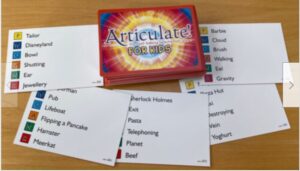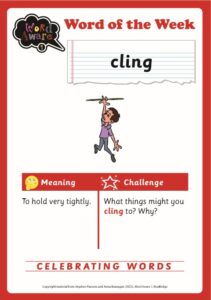During the first term we developed a culture of word learners through an introductory assembly, a vocabulary parade, word games and the introduction of word of the week. Our children are now excited about words, talking about language and they are busy collecting words. During the second and third terms we will teach vocabulary using the specific whole school approach as well as specifically teaching the strategies required to become independent word learners.
Children need twelve meaningful encounters of a word before they really know it. Word Aware promotes a method called STAR, which stands for Select, Teach, Activate and Review. This process ensures the children encounter the new words many times and in many different ways.
The Star Method
SELECT:
The teacher will select the appropriate words to teach the children using the Word Aware approach. These will be really useful words which are likely to be encountered again in spoken language or reading. The average adult will have a good level of knowledge of the word.
TEACH:
Teaching covers phonological sound, syntactic grammar and semantic meaning. In other words, we will be teaching the sound and initial letters of the word; what word class it is (for example, a noun, adjective, adverb, verb) including how the word is structured in a sentence; and what the word means. Other activities used include: word raps, word songs, acting out the word, discussing prefixes and suffixes, objects, picture or symbols of the word, spelling of the word, syllables, rhyme, physically experiencing the word (where possible) and links to what the children already know.
ACTIVATE:
To help a child remember and understand the word we need to activate it. The words ‘selected’ and taught will naturally fit into the lesson so this provides a useful vocabulary learning environment. The teacher and LSA will ensure the word is used many times in a lesson, pointing it out on the word wall and engaging the children in practical activities where they are thinking about the word in question. The language used to define the word will be accessible and multiple contexts provided to ensure a deeper understanding of the word. The children will be encouraged to use the word and this will be praised and highlighted to all.
REVIEW:
Once a word is taught, it is placed on the class word wall and into a word pot. We play games and ask questions which consolidate the children’s understanding of these words, see below for some questions we ask:
| What can it do? | What does it look like? | Describe it to your friend.
|
| Can you think of something that can be described as (target word)? | What verb does it describe or go with? | When might someone do this?
When might you do this? |
| Where might you see this word?
|
Think of a time when you could use this word. | I like/don’t like this word because….. |
| Which other word is a bit like this word?
How is it different from that word? |
The author chose this word. What other word could they have used? | How will you remember this word? |
These words are regularly reviewed (repeated) by the class in both writing and spoken language (both needed in the right context). We will also send out a list of words (fridge words) to allow you to discuss and review these words with your child at home. There will be an email explaining ‘fridge words’ once they are introduced across the school.
We need to understand and use a wide range of vocabulary to succeed at school and in life. To progress with reading, children need to understand the words they decode. To write well they need a wide and varied use of words. To understand all subjects the children need to understand the words that are used. We want to have fun with words and help our children succeed. We are all very excited about this new programme and look forward to embarking on this journey with you.
What you can do to support the Word Aware approach:
When reinforcing language ensure you use comments rather than questions. Comments are much less demanding than questions and they guide children in how to use the new word. By hearing the new word in a range of phrases and sentences, the children will learn so much more than from repetitive questioning. A sentence such as “A boxer will clench his/her fist inside his/her glove” is far more meaningful and gives the children more information than asking, “What does clench mean?” If we want the children to use their new vocabulary in sentences, we need to make sure they hear the new word in sentences.
Try out some of the games below to help develop vocabulary.
Find it – before or even after reading a book with your child identify words they might not understand, write them down and ask them to find it in the story, can they use the clues and their reading skills to work out what it means. If appropriate, they could use a dictionary to find the meaning or look in a thesaurus to find words with similar meanings. Otherwise you can provide a definition of the word and give a few examples of its use in context.

Articulate – describe a word without using key words (or just the word itself if you want to simplify it), you can buy this or make your own version with your child’s topic words e.g waterproof. Your child might say; it doesn’t let water in, welly boots are this!
Splat it – spread out/write down some target words. Give a definition of one of these words and your child can say which one you are describing by either hitting it with a fly swat or by throwing beanbags or a pair of bunched up socks e.g absorbent. This is something which soaks up water, like a cloth. (When we send home fridge words, our simplified school definition will be attached).

Treasure Hunt – on the way to and from school, look for things you could describe by a particular word like shrivelled or spiky. Categories such as living things, things with circles, things with engines.
Touch, taste and smell – take every opportunity to describe sensory experiences. Ask your child to describe it to you, try to encourage them to use more detailed words than nice or bad, such as rough or sweet.

Word of the week – as a family see how many times you can use your target word in a meaningful way during the week. The only rules are the sentence must make sense and fit into your conversation.
Remember to try and use these new words in your conversations to embed them into your child’s vocabulary.
Try some of these ideas and become splendiferous word collectors together!

